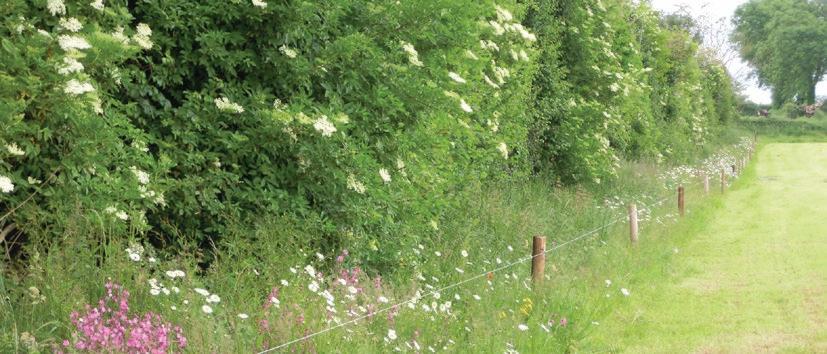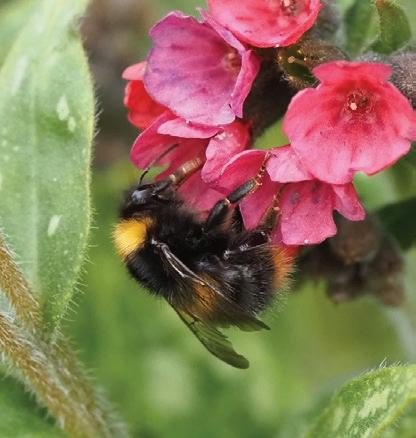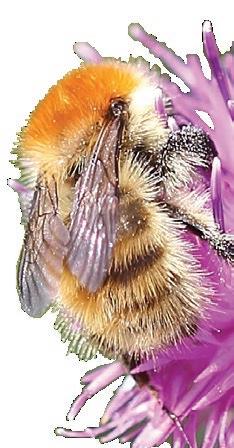
7 minute read
Objective 01 Making farmland pollinator friendly
OBJECTIVE 01
Making farmland pollinator friendly
Advertisement
Farmland targets for 2021–2025:
TARGET 1.1 Increase the amount of farmland that is managed in a pollinator-friendly way
TARGET 1.2: Encourage the sustainable use of agricultural pesticides (insecticides, fungicides, and herbicides)
TARGET 1.3 Provide clear information and training on pollinators to the farming community
TARGET 1.4 Raise awareness and celebrate pollinator diversity on farmland
TARGET 1.5 Track changes in pollinators on farmland
Funding: Full delivery of this objective will require a dedicated AIPP Farmland Project Officer. Initial funding for this post has been agreed with the Department of Agriculture, Food and the Marine (DAFM).
It is assumed that organisations who accept responsibility for an action will also accept funding responsibility. Actions that require additional funding are highlighted.
Target 1.1
1.1 Action
1 Incorporate relevant evidence-based pollinatorfriendly actions and prescriptions into agricultural and agri-environment schemes in Republic of Ireland (RoI).
Progress measure
Incorporation of pollinator conservation actions into agrienvironment schemes Uptake by farmers Department of Agriculture, Food and the Marine (DAFM)
Responsibility
2 Incorporate relevant evidence-based pollinatorfriendly actions and prescriptions into existing agricultural and agrienvironment schemes in Northern Ireland (NI). Incorporation of pollinator conservation actions into existing agri-environment schemes Uptake by farmers Department of Agriculture, Environment and Rural Affairs (DAERA)
3 Encourage more organic farming (which has been shown to support more pollinators). Participation in the Organic Farming Scheme
4 Establish a network of stakeholders, including agri-businesses who agree to manage their own farms or test sites in a pollinatorfriendly way, e.g. DAFM, AFBI, individual agri-businesses. Networks of sites identified Progress reported annually Sites used to develop case studies which are shared within the network DAFM
AIPP Farmland Officer
Target 1.2
1.2 Action
5 Encourage the responsible and sustainable use of pesticides (insecticides, herbicides and fungicides) in RoI.
Progress measure
Through the National Action Plan for the Sustainable Use of Pesticides, encourage farmers to minimise the impact of pesticides on pollinators DAFM
Responsibility
6 Encourage the responsible and sustainable use of pesticides (insecticides, herbicides and fungicides) in NI. Through the UK National Action Plan for the Sustainable Use of
Pesticides (Plant Protection Products) and DAERA Integrated
Pest Management Guidance, encourage farmers to minimise the impact of pesticides on pollinators Support the UK-wide Voluntary Initiative on Promoting
Responsible Pesticide Use DAERA/Agri-Food and Biosciences Institute (AFBI)
Ulster Farmers’ Union (UFU)
7 Summarise and publish annual trends in agricultural pesticide use across the island. Summarised trends published for RoI Summarised trends published for NI DAFM and AFBI
Target 1.3
1.3 Action
8 Establish an All-Ireland farming subgroup to advise and steer on pollinator actions for farmland from the farmers’ perspective.
Progress measure
Establish the subgroup Group meeting at least annually, either in person or remotely
Responsibility
AIPP Project Manager, supported by Farmland Officer
9 Provide comprehensive and freely available online resources for the farming sector at www.pollinators. ie/farmland
10 Establish a knowledge exchange programme for farmers on protecting pollinators. Up-to-date resources provided on the website To include: evidence-based guideline documents, flyers, videos, blogs, webinars, presentations, case studies, animations All 2015–2020 resources to be updated where necessary AIPP Farmland Officer
Knowledge exchange programme developed and rolled out Farmer participation DAFM, Teagasc, College of Agriculture, Food and Rural Enterprise (CAFRE)
1.3 Action
11 Agricultural colleges to support training and awareness-raising in RoI.
12 Agricultural colleges to support training and awareness-raising in NI.
13. Farming organisations and agricultural networks to promote pollinatorfriendly actions to their members.
Progress measure
Adoption of pollinator-friendly management within college sites as a teaching and awareness-raising tool Incorporation of material on the identification and conservation of pollinators within relevant teaching programmes
Responsibility
Teagasc
Adoption of pollinator-friendly management within college sites as a teaching and awareness-raising tool Incorporation of material on the identification and conservation of pollinators within relevant teaching programmes CAFRE
Partner organisations to promote pollinator-friendly actions Those listed under responsibility agreed to this action at time of publication UFU, Irish Organic Association, Organic Trust, others to agree
14 Publish a guideline document outlining evidence-based pollinator actions for forestry.
15 Publish a guideline document that links pollinator/biodiversity actions to their carbon/ climate benefits on farmland. Publication of guidelines for forestry Dissemination to all relevant bodies
Collation of all relevant research necessary for this document Publication when a sufficient evidence base is in place
16 Publish other new evidence-based pollinator guideline documents for the farming sector as necessary. Investigate which guideline documents are required and prioritise a programme for their development. May include, but not limited to: ç Pollinator-friendly management of stud farms (equine industry) ç Integration of pollinator-friendly guidelines into the
Agricultural Catchments Programme ç Development of pollinator-friendly guidelines for archaeological sites on farmland AIPP Farmland
17 Promote best practice in the use of imported bumblebee colonies. Relevant organisations to disseminate the evidence-based guideline document: Guidelines for users of imported bumblebee colonies (AIPP, 2020) AIPP Farmland Officer and relevant partners
AIPP Farmland Officer and relevant partners
Officer and relevant partners
Teagasc, DAERA, Bord Bia
18 Promote the AIPP at key agricultural events. Attendance at the National Ploughing Championship, RoI Attendance at the Balmoral Show, NI Attendance at other relevant agricultural events AIPP Farmland Officer
Target 1.4
1.4 Action
19 Investigate the potential for an All-Ireland farmland meadow competition.
Progress measure
Scoping study on a potential meadow competition to celebrate the diversity and importance of natural farmland meadows for pollinators/biodiversity Should link to future agri-environment initiatives where appropriate Should build on learning from the Save our Magnificent
Meadows project in NI (2014–2017) To include an investigation of the potential for green hay exchange To include an investigation into creating a future donor site map for wildflower seed collection for local restoration projects If funding is sourced, this should be rolled out on a gradual scale as the first building block in creating a network of flower-rich meadows across farmland
Responsibility
Coordinated by AIPP Farmland Officer
Needs a funding body/sponsor
20 Investigate the potential for an annual May Hedgerow Festival. Scoping study on a potential Hedgerow Festival to celebrate the uniqueness and value of native hedgerows (Run in May when native hedgerows are in full flower) Should include biodiversity as well as cultural components and bring in the wider community to celebrate and appreciate farmers as protectors of this vital habitat Should stress the importance of hedgerows as networks for nature and for carbon capture Should link with the Teagasc Hedgerow Week in September which promotes good hedgerow management If funding is sourced, this should be rolled out on a gradual scale
Coordinated by AIPP Farmland Officer
Needs a funding body/sponsor
21. Run a campaign to raise awareness and celebrate pollinator diversity on farmland. Awareness-raising campaign rolled out. This to be largely social media based, but may also include newsletters, blogs, videos, etc. This to be run in collaboration with an existing National
Biodiversity Data Centre project: Protecting Farmland
Pollinators EIP 2019-2023 (funded by DAFM through the
European Innovation Partnership) National Biodiversity Data Centre
Target 1.5
Track changes in pollinators on farmland
1.5 Action
22 Publish an annual review of farmland actions.
Progress measure
Development of an annual review outlining progress within actions under this objective Publication on AIPP website each December
Coordinated by AIPP Farmland
23 Track progress within the farmland sector. Open up the online mapping system Actions for Pollinators to the farmland sector https://pollinators.biodiversityireland.ie/ Number of farms logging their pollinator-friendly actions
Responsibility
Officer
AIPP Farmland Officer
24 Monitor pollinators across a network of farmland sites. Investigate the framework necessary for a national pollinator monitoring scheme to include sites across farmland, public and protected land. This should be in line with the European
Pollinator Monitoring Scheme recommendations (2020) Source funding and roll out this scheme to monitor pollinators across a network of farmland sites National Pollinator Monitoring Scheme requires funding
25 Publish an annual farmland pollinator index. Based on the annual data from a National Pollinator Monitoring Scheme, publish annual trends as a farmland pollinator index National Pollinator Monitoring Scheme
26 Develop a Citizen Science recording scheme for farmland. Investigate the possibility of creating a simple, tailored Citizen
Science scheme for farmers to enable them to track changes in common pollinators on their land Pending funding, roll out this scheme nationally AIPP Farmland Officer & National Biodiversity Data Centre, Centre for Environmental Data and Recording NI (CEDaR)











